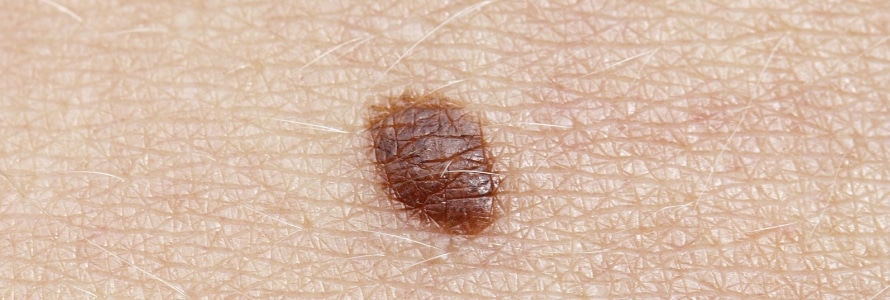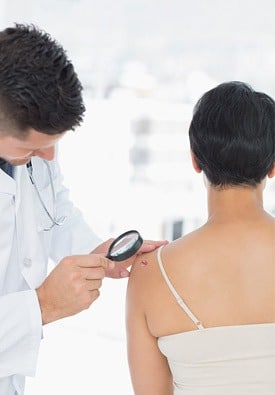
Screening, Diagnosis, Treatment and Management

Basal cell carcinoma is the most common form of skin cancer and the most common cancer of human beings. More than two million cases are diagnosed each year in the United States. Basal cell carcinoma usually develops on sun-exposed skin such as the head, neck, and back of the hands. The chest, back, and lower legs are also frequent locations, with the face being especially common.
People who use tanning beds have a much higher risk of getting basal cell carcinoma. They also tend to get it earlier in life. This type of skin cancer grows slowly and it rarely spreads to other parts of the body. Treatment is quite important because basal cell carcinomas can grow wide and deep, destroying tissue and bone. If ignored, it can destroy the nose, an ear, an eye, or cause death.
Signs and Symptoms of Basal Cell Carcinoma
Basal cell carcinoma is sometimes hard to recognize because it can look different based on the type of cancer it is. You should immediately make an appointment with Dr. Brian Mekelburg if you see any of the following:
- Type 1
A dome-shaped skin growth with visible blood vessels. These are often pink or skin colored. Basal cell carcinomas can also be brown or black, or have flecks of these colors. It may flatten in the center, crust over, and bleed easily. - Type 2
A shiny pink or red, slightly scaly patch. It grows slowly and may be mistaken for a patch of eczema. - Type 3
A waxy-hard, pale white-to–yellow, or skin-colored growth that looks like a scar. The edges may be unclear. - Type 4
A persistent sore that may heal briefly, only to open again.
Below are basal cell carcinoma pictures. If any of your sores look similar, please make an appointment.

Risk Factors for Basal Cell Carcinoma
Anyone can get this common skin cancer, but some have a higher risk than others. Those higher risks include:
- Light-colored or freckled skin
- Blue, green, or gray eyes
- Blonde or red hair
- Sunburn easily or have an inability to tan
- Indoor tanning
- Time outdoors and with no sun protection
I have been to him a few times to address possibly cancerous skin issues and he has had to remove a few of them. These were incredibly painless and fast procedures and I healed up very quickly! I just made an appointment to see him again…good guy!
– Patient
Please note that results may vary from patient to patient.
Treatment Options for Basal Cell Carcinoma
Dr. Brian Mekelburg can diagnose a basal cell carcinoma through a biopsy during a routine office visit. Once the diagnosis of basal cell carcinoma is confirmed by a biopsy, a treatment plan can be made.
Treatment options include:
Scrapping of the growth from the remaining tissue then applying heat to destroy and residual tumor cells. > Learn More About Curettage and Electrodessication
Removal of the entire growth, along with a surrounding border of normal skin. Stitches are used to then close the wound. > Learn More About Excisional Surgery
Removal of the tumor and surrounding normal tissue with a scalpel. This technique saves the greatest amount of healthy tissue and has the highest cure rate. Moh’s is mostly used for high risk tumors on the face. > Learn More About Moh’s Micrographic Surgery
Imiquimod and 5-fluoruracil (5-FU) are FDA-approved medications for superficial basal cell carcinomas. Both treatments have minimal risk and discomfort. > Learn More About Imiquimod and 5-Fluoruracil
Radiation is generally reserved for the elderly or others in poor health. Cure rates are around 90 percent. > Learn More About Radiation
For carcinomas that spread or can’t be cured with other treatment options, targeted therapy through oral treatments such as Vismodegib (Erivedge) can help shrink or slow the tumor. > Learn More About Targeted Therapy
Risk of Recurrence
For those who have had a basal cell carcinoma, there is an approximately 50 percent chance of getting another one in the five years following the first one. Dr. Brian Mekelburg recommends twice yearly screening visits if you have already had a Basal Cell Carcinoma.
The screening, diagnosis and management of basal cell carcinoma are a core commitment of our practice. Please contact us for more information.


